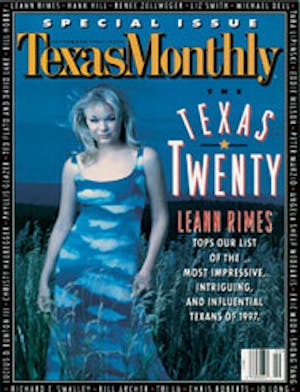THE HOTTEST RECORD OF THE SUMMER has been a gospel tune with a secular sound performed by a Dallas–Fort Worth youth choir named God’s Property. Kirk Franklin, the 27-year-old Fort Worth native who changed the face of gospel music, wrote, produced, and sang lead on the 45-voice group’s swaying, foot-pounding, hand-clapping “Stomp,” and the song has outdone even Franklin’s previously unprecedented crossover success: It became the first gospel video ever to go into heavy rotation on MTV. The album it appears on, God’s Property From Kirk Franklin’s Nu Nation (B-Rite Music), sold nearly half a million copies in its first month of release and went on to top the gospel and urban charts while reaching number three on the pop charts.
Franklin’s involvement has been partly responsible for the success of G.P. (as the group is sometimes called), which was formed late in 1992 by Linda Searight, an operatically trained singer who has taught music in various Dallas schools for 28 years. The nucleus of the group (which includes three of Searight’s own kids) came from Booker T. Washington High School for the Performing and Visual Arts. “I saw my son Robert (now G.P.’s music director) and other kids trying to sing gospel music there,” she recalls, “but with a more creative edge. They were having fun.” Members range in age from 15 to 25; some walked away from gangs and drugs to join the choir.
Franklin got involved the next year, when the Dallas–Fort Worth Mass Choir (with which he sang) and later the Family (the group he formed upon leaving the Mass Choir) performed on the same bill as God’s Property. He invited G.P. to sing on his 1995 CD Whatcha Lookin’ 4, and he wrangled them a slot (“My Life Is in Your Hands”) on the soundtrack to the 1996 Spike Lee film Get On the Bus. When he finally got his own production deal, he made God’s Property his first project.
Working out of Concordia Baptist Church in South Dallas, Franklin and the group, including a funky eleven-piece band, put together an album. They wanted to make gospel music for the street, an approach that has brought Franklin two multiplatinum albums and made him both a spiritual and a secular icon to black America. G.P.’s “Faith” samples from the Pointer Sisters hit “Yes, We Can Can,” while “Stomp” samples Parliament/Funkadelic’s “One Nation Under a Groove” and features an original rap from Cheryl James (Salt, of Salt-n-Pepa).
Although it was never formally released as a single, “Stomp” was an immediate hit, both in church and on the street. Dressed in jerseys that are a cross between choir robes and sports uniforms, a twenty-voice version of God’s Property toured most of the summer with a five-piece band, playing nightclubs and religious programs, appearing on the Jay Leno and the David Letterman shows, and even hosting MTV’s Beach Party. “Going into nightclubs, that’s just God comin’ through wherever he wants to come through,” says Searight. “The nature of what we’re doing is outreach. And that means you have to reach out to bring in.”
- More About:
- Music
- Fort Worth
- Dallas






